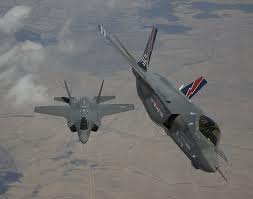
New Delhi, July 24: After describing India as "a linchpin" in its new strategic policy to "re-balance" military forces towards Asia-Pacific, in what is seen by many to be an unfolding grand design to "contain" China, the US is now cranking up its arms sales pitch to New Delhi.
From ballistic missile defence (BMD) and aeronautics to robotics and micro-UAVs (unmanned aerial vehicles), the US is eager to collaborate with India in top-end defence technology in a bid to displace countries like Russia, Israel and France as the pre-eminent defence supplier to India.
India plans to spend upwards of $100 billion in acquiring weapon systems and platforms over the next decade. Having already bagged defence deals worth over $8 billion over the last few years, the US is obviously hungry for more.
"As a country committed to enduring peace and security in the Asia-Pacific region, India deserves the best military equipment available... India is a top priority in our export considerations," said visiting US deputy secretary of defence Ashton B Carter on Monday.
"Practically, we want to be India's highest-quality and most trusted long-term supplier of technology...We trust India and know India is not a re-exporter or exploiter of our technologies," he added, speaking at a CII function.
Carter, who held talks with defence minister A K Antony, national security advisor Shiv Shankar Menon, defence secretary Shashikant Sharma and foreign secretary Ranjan Mathai during the day, said New Delhi had emerged Washington's second largest FMS ( foreign military sales) customer in 2011 with imports worth $4.5 billion.
India has certainly shed its long-held suspicions about the US not being a reliable long-term defence supplier to India, in part due to continuing problems with Russian propensity to jack-up costs mid-way through projects and not provide proper transfer of technology and product support.
But it still remains wary about whether the US will really provide cutting-edge defence technology.
Carter stressed US and India will move beyond mere defence trade, or a buyer-seller relationship, to joint R&D and co-production in the years ahead. He identified BMD as a potential area for this defence cooperation but said the two nations should first discuss it at the "strategic" level before engaging in technical discussions.
"We want to knock down any remaining bureaucratic barriers in our defence relationship, and strip away the impediments...Buying American systems, whether through direct commercial sales or FMS, will get India exceptionally high-quality technology, a high degree of transparency, and no corruption (this is mandated by our legal system)," he said.
The Indian defence ministry, too, seems to favour the direct government-to-government agreement under the American FMS system. India, for instance, is now close to inking $647 million contract for the acquisition of 145 M-777 ultra-light howitzers from the US in a FMS deal. This comes after the finalization of another such deal worth $4.1 billion for 10 C-17 Globemaster-III strategic airlift aircraft.





Comments
Add new comment